

Bovier, Chamot and Perneger (2004) have proposed that stress, internal resources such as mastery and self-esteem and social support are components that affects an individual's state of mental health. They found that stress is the strongest correlate in relation to the state of one's mental health.
In the recent decades, news and media outlets have reported that the highest levels of stress has been found in young adults. The articles are attached below.
Young Adults and Their Mental Health. Though 31 years old is the average onset of generalized anxiety disorder (GAD), some research suggests that symptoms (including subclinical presentations in teens) may occur long before the individual seeks treatment.

In addition, GAD is one of the most commonly experienced psychiatric problems in children. It is, therefore, important to understand what young people think about GAD, and more broadly, how they perceive mental health issues overall. The Mental Health and Suicide Survey was an online survey to evaluate perceptions of mental health and suicide awareness conducted within the United States. If you are having suicidal thoughts, contact the National Suicide Prevention Lifeline at 1-800-273-8255 for support and assistance from a trained counselor.
If you or a loved one are in immediate danger, call 911. Two thousand and twenty adults responded. Who's feeling stressed? Young adults, new survey shows. Stress levels for Americans have taken a decidedly downward turn across the USA — except for young adults, whose stress is higher than the national norm, says a survey to be released Thursday.
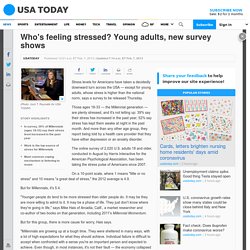
Those ages 18-33 — the Millennial generation — are plenty stressed, and it's not letting up: 39% say their stress has increased in the past year; 52% say stress has kept them awake at night in the past month. And more than any other age group, they report being told by a health care provider that they have either depression or an anxiety disorder.
The online survey of 2,020 U.S. adults 18 and older, conducted in August by Harris Interactive for the American Psychological Association, has been taking the stress pulse of Americans since 2007. On a 10-point scale, where 1 means "little or no stress" and 10 means "a great deal of stress," the 2012 average is 4.9. But for Millennials, it's 5.4. "Younger people do tend to be more stressed than older people do. "Millennials are growing up at a tough time. Young adults spend more than six hours per day feeling ‘stressed out’, finds Mental Health study. Young adults spend more than six hours a day "stressed out", a study has found.
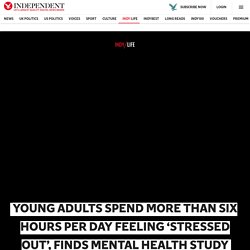
A poll of 1,000 18-25-year-olds found money, appearance and career worries as well as fears about the future mean a large chunk of their time is spent feeling anxious or under pressure. But one in 10 feel they have no-one to turn to discuss their concerns, leaving them to face their fears alone. Download the new Independent Premium app Sharing the full story, not just the headlines A further 67 per cent admitted they had come across problems in their life where they felt they had nobody to lean on for help.
As a result, 56 per cent have ended up in more trouble after keeping a problem to themselves rather than confiding in someone else. The statistics emerged in a study by charity, UK Youth, to launch its #KeepMeSafe campaign, which calls on all organisations working with young people to "look" at their safeguarding policies, "listen" to young people and take action during National Safeguarding Month. 1. 2. 3. The Most Stressed-Out Generation? Young Adults. The latest survey shows stress is on the decline overall but still hover above healthy levels, especially for young adults.
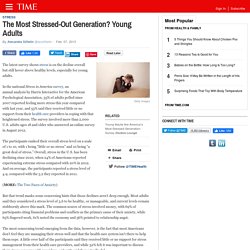
In the national Stress in America survey, an annual analysis by Harris Interactive for the American Psychological Association, 35% of adults polled since 2007 reported feeling more stress this year compared with last year, and 53% said they received little or no support from their health care providers in coping with that heightened stress. The survey involved more than 2,000 U.S. adults ages 18 and older who answered an online survey in August 2012. Factors Contributing to Stress in Young Adults. Stress in Young Adults (6 Common Causes) - Paradigm YAP. What causes stress in young adults?
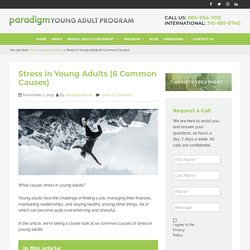
Young adults face the challenge of finding a job, managing their finances, maintaining relationships, and staying healthy among other things. All of which can become quite overwhelming and stressful. Stress Symptoms, Signs, and Causes. In today’s fast-paced world, chronic stress is common, but your mind and body can pay a high price.
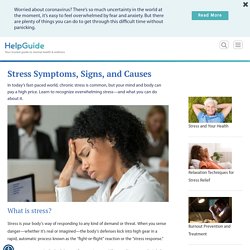
Learn to recognize overwhelming stress—and what you can do about it. What is stress? Stress is your body’s way of responding to any kind of demand or threat. When you sense danger—whether it’s real or imagined—the body’s defenses kick into high gear in a rapid, automatic process known as the “fight-or-flight” reaction or the “stress response.” The stress response is the body’s way of protecting you. The Main Causes of Stress. Stress is normal and, to some extent, a necessary part of life.
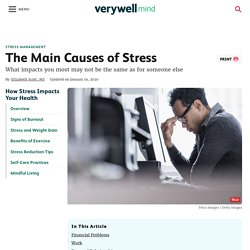
Despite it being something everyone experiences, what causes stress can differ from person to person. For instance, one person may become angry and overwhelmed by a serious traffic jam, while another might turn up their music and consider it a mild inconvenience. A fight with a friend might follow one person around for the rest of the day, while another might easily shrug it off. What's causing you stress may already be something you're abundantly aware of. But given the importance of keeping stress in check when it comes to mitigating the effects it can have on your physical and mental health, it's worth opening yourself up to the possibility that other factors may be at play, too.
Financial Problems According to the American Psychological Association (APA), money is the top cause of stress in the United States. 20 Tips to Cope With Stress. Evelyn Boon, Senior Principal Psychologist from the Department of Psychiatry at Singapore General Hospital shares 20 tips to help you better deal with stress.
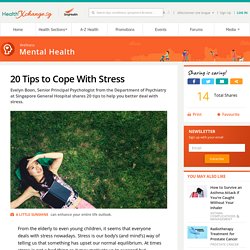
From the elderly to even young children, it seems that everyone deals with stress nowadays. Stress is our body’s (and mind’s) way of telling us that something has upset our normal equilibrium. Stress Management: 13 Ways to Prevent & Relieve Stress. Stress Management: How to Reduce, Prevent, and Cope with Stress. It may seem that there’s nothing you can do about your stress level.
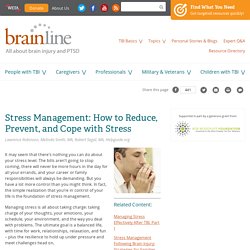
The bills aren’t going to stop coming, there will never be more hours in the day for all your errands, and your career or family responsibilities will always be demanding. But you have a lot more control than you might think. In fact, the simple realization that you’re in control of your life is the foundation of stress management.